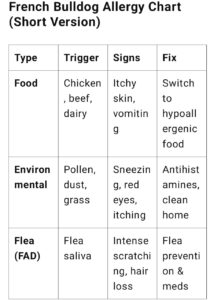French Bulldog Allergies: Complete guide to Caregivers
Even though French Bulldogs are cute little dogs, they can have allergies just like many other breeds. French Bulldog allergies naturally happen due to things like food, pollen, or chemicals in their environment. These allergies can make them feel very uncomfortable and often need attention and care. This piece will talk about what causes French Bulldog allergies naturally, their symptoms, how to treat them, and how to help prevent them.
What Do Allergies Mean? 🤏

The immune system of a dog reacts to something in their surroundings, food, or other things that set off the allergy. This could be anything for French Bulldogs, from the food they eat to the pollen in the air. Allergies can make you itch, irritate, and feel bad. Let’s look at it in more detail!
Different Kinds of Allergies French Bulldogs 🐋
1. Being allergic to food 🍗🥦

French Bulldogs can be allergic to some things that are in food. These are the most usual culprits:
Chicken 🍗
Milk 😀
Wheat 🌾
Corn 🌽
Because of what it ate, your French Bulldog might be having stomach problems, itchy skin, or ear infections.
2. Allergies to the environment ▌
Some common outdoor allergens are
Pollen ▌
Dust 🥗
Mold 🍄
Smells and chemicals 😴
When French Bulldogs have these allergies, they often sneeze, have watery eyes, or have skin that itches.
3. Call Allergies 💲
There are times when French Bulldogs respond to things they touch. These could be:
Flea bites 🐻
Some clothes or cleaning supplies 🤽
Grass and plants 🌿
Most of the time, these reactions show up as rashes, itching, or red skin.
4. An allergy to fleas 🐍
Flea issues can also happen to French Bulldogs. This takes place when fleas bite them and their immune system responds to the flea’s saliva. People who are allergic to fleas have severe itching and skin inflammation.
Signs That Your French Bulldog Is Allergic 😣
What can you do to tell if your French Bulldog has allergies?
1. Skin that itch 🐎
A common sign of allergies is when they scratch or bite at their skin all the time, especially around the ears, belly, and paws.
Skin that is red and swollen 😃
Skin that is allergic to things can turn red and swell up. It could mean something if your dog’s skin looks red or bumpy.
There was sneezing and coughing 🤧
Your French Bulldog may sneeze or cough a lot because of allergies to pollen or dust.
4. Eyes That Wet 👀
Eyes that are itchy and runny, and sometimes red or swollen, can be caused by allergies.
If your French Bulldog has allergies, they are more likely to get ear infections. If they shake their head or scratch their ears, that’s a sign.
6. Problems with digestion 🍽
If your dog has food allergies, it might vomit, have diarrhea, or have stomach pain.
Diagnosing Allergies in French Bulldogs 🩺
If you observe signs of allergies in your French Bulldog, it is crucial to seek a diagnosis from a veterinarian. The following steps outline how they may determine the presence of allergies:
1. Veterinary Consultation 🐾
The veterinarian will inquire about your dog’s symptoms and medical history, and may conduct a physical examination.
2. Allergy Testing 🧪
Blood tests or skin tests can assist in identifying the specific allergens responsible for your dog’s reactions.
3. Food Trials 🍽
If your vet thinks food allergies might be the issue, they may suggest a food trial. This involves providing your French Bulldog with a specialized diet for several weeks to monitor any improvement in symptoms.
Treating French Bulldog Allergies 💊

Once the allergens have been identified, treatment can commence. Here are some common methods for managing allergies in French Bulldogs:
1. Medications 💉
Antihistamines can alleviate itching and sneezing.
In cases of severe symptoms, steroids may be prescribed.
Immunotherapy (allergy shots) can gradually desensitize your dog to specific allergens.
2. Dietary Changes 🥘
If food allergies are the issue, your veterinarian may suggest transitioning to a hypoallergenic diet, which excludes common allergens such as chicken or grains.
3. Flea Control 🐜
For dogs with flea allergies, it is essential to implement an effective flea prevention strategy.
This might include using skin creams, pills, or flea control collars.
4. Regular Grooming 🧴
Regular baths with a gentle, hypoallergenic dog shampoo can help soothe irritated skin. Regular brushing also helps remove allergens such as pollen and dust.
5. Environmental Changes 🌱
Maintain a clean and allergen-free home by vacuuming regularly, utilizing air purifiers, and keeping windows closed during peak pollen seasons.
Preventing Allergies in French Bulldogs 🚫
While it is impossible to completely eradicate allergies, there are measures you can take to reduce the risk:
1. Avoid Common Allergens 🏡
Ensure your home is free from dust, mold, and pet dander.
Limit your dog’s exposure to known allergens.
2. Use Hypoallergenic Products 🧴
Select mild, fragrance-free shampoos specifically designed for dogs.
Utilize natural or hypoallergenic cleaning agents in your household.
3. Ensure Proper Nutrition 🍽
Provide your French Bulldog with high-quality, allergy-sensitive food that is devoid of common allergens.
4. Schedule Regular Veterinary Check-ups 🩺
Maintain your dog’s annual veterinary appointments to facilitate the early identification of any allergy-related issues.
When to Consult a Veterinarian for Allergies 🏥
If your French Bulldog exhibits severe or ongoing allergy symptoms, it is advisable to seek veterinary assistance. Be vigilant for the following indicators:
Intense itching that results in sores or infections.
Respiratory issues such as wheezing or difficulty in breathing.
Persistent swelling or hives that do not resolve.
Chronic ear infections that fail to improve with treatment.
Overall
Managing allergies in French Bulldogs can be difficult, but with appropriate care and treatment, your dog can enjoy a happy and comfortable existence. Identifying the allergy triggers, administering the correct medications, and implementing a few lifestyle adjustments can significantly enhance their well-being. Remain observant for symptoms, and do not hesitate to seek veterinary guidance when necessary. Your French Bulldog will appreciate your efforts!
FAOs
1. What are the typical indicators of allergies in French Bulldogs?
Allergies in French Bulldogs often show up as itching, red skin, sneezing, or watery eyes. Some dogs may also lick their paws a lot.
2. Can food trigger allergies in French Bulldogs?
Indeed, certain food items such as chicken, beef, or wheat can lead to allergies in French Bulldogs. A veterinarian can assist in identifying the specific allergen.
3. Do allergies in French Bulldogs resolve independently?
In most cases, allergies in French Bulldogs do not resolve without intervention. They typically require treatment, specialized diets, or medication.
4. How do veterinarians diagnose allergies in French Bulldogs?
Veterinarians assess symptoms and may conduct skin or blood tests to determine the underlying causes of allergies in French Bulldogs.
5. Can French Bulldog allergies develop at any stage of life?
Yes, French Bulldogs can develop allergies as puppies or later in adulthood.




Thanks for your help and for writing this post. It’s been great. http://www.kayswell.com
May I have information on the topic of your article? http://www.goodartdesign.com
The articles you write help me a lot and I like the topic http://www.kayswell.com
You helped me a lot by posting this article and I love what I’m learning. http://www.kayswell.com
May I request that you elaborate on that? http://www.ifashionstyles.com Your posts have been extremely helpful to me. Thank you!